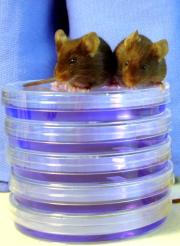Mouse Atlas of Gene Expression web site launched
The project "A Quantitative and Comprehensive Atlas of Gene Expression in Mouse Development" has the goal of creating a new and unique resource that will characterize the development of the mouse. The atlas will identify genes that are activated or expressed at various stages of mouse development in different types of tissues. Scientific data created by this project is publically available for download at the Mouse Atlas of Gene Expression web site located at http://www.mouseatlas.org.

Laboratory mice used in the project
Currently, as of November 12th, 2003, there are 28 Serial Analysis of Gene Expression (SAGE) libraries available on the web site. New libaries are being added at a rate of one or two per week, with an overall goal of sequencing a total of 150 SAGE libraries over the next two years. The Mouse Atlas web site currently allows downloading of tag counts per library, and also provides data on the parameters and methods used during the preparation and sequencing of the library. In the future, images and notes on the tissues dissected will be made available, to give scientists a more accurate picture of the considerations used in the preparation of the tissues.
The Mouse Atlas of Gene Expression project is directed by Dr. Marco Marra and Dr. Pamela Hoodless. The project is funded by Genome BC and Genome Canada, and is receiving matching funds as well as intellectual input from a variety of research institutions: the US National Cancer Institute, the University of Washington, the Whitehead Institute/MIT Center for Genome Research, and the Sanger Centre near Cambridge, in the UK.
The project involves researchers from the BC Cancer Agency, the Centre for Molecular Medicine and Therapeutics at the University of British Columbia, and collaborators at the U.S. National Cancer Institute.
A more complete overview of the project is available on the Genome BC and Genome Canada web sites.
